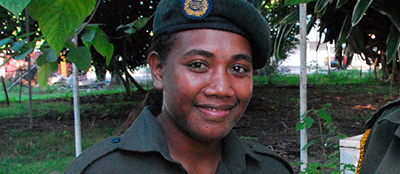There is consensus that donor approaches to SSR have failed to achieve the ambitious goals and objectives espoused in policy documents. Debates in recent literature centre on the reasons for this ‘policy-practice gap’ (Sedra, 2010; Bakrania, 2014b). Key themes include: There is agreement in the literature that donor assistance has generally taken an apolitical and technical ...» more
Governance
Integrated programmes supporting adolescent girls
This rapid review provides examples of integrated programmes that support adolescent girls. The programmes have positive impacts on girls’ empowerment, livelihoods, health and education. Evaluations found that girls especially appreciated having a nearby safe space of their own and being educated by their peers. Girls who participate in integrated programmes may experience the ...» more
Statebuilding and peacebuilding
Statebuilding and peacebuilding, while conceptually distinct, are becoming more closely integrated in academic and policy circles. This Topic Guide looks at the links (and tensions) between statebuilding and peacebuilding, how these activities interact, and how they can be approached in practice. A related Guide looks at State-Society Relations and Citizenship in Situations of ...» more
Supporting local governance in protracted conflicts
Successful interventions to support the delivery of services by local governments and administrations have been undertaken in a number of countries, including Afghanistan, Nepal, Somalia and Sudan. The majority of these interventions fall into the community-based approaches category. These are often used in areas where there is no effective local government or where supporting ...» more
Grievance Redress Mechanisms in Pakistan
Research for this report identified five GRM examples, though with varying levels of evaluation and assessment documentation. Many of these GRMs would not strictly be described as models but rather programmes, or sets of activities within programmes, that provide redressal of grievances. There is not a definitive list of essential components for GRMs. Consequently this ...» more
Interventions to counter hate speech
There is limited evidence on the effectiveness of interventions to counter hate speech. There is a lack of rigorous impact evaluations in this area and those that do exist tend to focus on individual case studies. Interventions to counter hate speech which have had some success include: Television programmes: In Kenya four episodes of a popular television series were ...» more
Social mobilisation in urban contexts
Suggestions for improving urban social mobilisation include: Self-help groups: Creating community groups for expectant mothers, for example, or certain types of workers, can provide a basis for social support. These can used as a basis for social mobilisation to enable the public to demand and gain access to services. Issue-based targeting of individuals and groups: This ...» more
Elected women’s effectiveness at representing women’s interests
This rapid literature review collates evidence on women’s actions and interactions in parliaments in Africa. The literature mostly focuses on Rwanda, South Africa, Uganda and Tanzania (Bauer, 2012). There are several consistent findings from African countries, which enables drawing together key lessons: Effectiveness at representing women’s interests: The presence of ...» more
Post-2015 accountability mechanisms
Key messages: The Post-2015 Development Agenda refers to a currently ongoing process of defining the future global development framework, which will succeed the United Nations (UN) Millennium Development Goals (MDGs). The details and wording are yet to be agreed, but there are, however, a significant number of proposals for goals and targets, and with them descriptions, in some ...» more
Lesbian, gay, bisexual, transgender and intersex rights in national human rights institutions
NHRIs almost unanimously take a universal human rights stance which is validated and backed up by the UN. This institutional support allows NHRIs to criticise governments for failing to support certain human rights. NHRIs often emphasise that LGBTI rights are contained within existing UN rights principles, particularly the rights to privacy, health, life, freedom from ...» more
Working with members of parliament’s constituency funds
The key points from this rapid literature review include: CDFs are a relatively recent phenomenon (with most being established from the 2000s onwards), and they are relatively few in number (Barkan & Mattes, forthcoming). As a result, little is known about them. Countries that have used CDFs include: South Sudan; Philippines; Honduras; Nepal; Pakistan; Jamaica; Solomon Islands; ...» more
Practical guidance to integrate gender into public financial management
A medium-sized body of rigorous literature provides guidance on how to integrate gender into PFM systems successfully. Guidance on effective approaches: - Overall requirements are: securing the known enabling factors (such as sustained political support, sufficient capacities and conducive institutional arrangements); adapting to context; involving a range of stakeholders ...» more
Problem-driven iterative approaches and wider governance reform
A problem-driven, iterative approach to institutional reform involves (i) solving defined performance problems through (ii) creating an environment amenable to experimentation, (iii) creating tight feedback loops, and (iv) engaging a broad set of actors. Such an approach has recently been termed as PDIA (problem-driven iterative adaptation), with analysis suggesting that ...» more
New thinking on governance issues
There is a wide and diverse literature on political economy, public administration, public financial management, procurement, and social accountability. This literature search is neither comprehensive nor exhaustive, but instead a rapid review that looks to identify literature that provides novel approaches or insights, as well as notable literature that provides a good ...» more
Evidence of impact of emergency cash transfers on gender and protection
Key messages: The major trends and gaps in the evidence in this report are: On the whole, ‘gender’ is used to refer to women. More recent papers include more analysis of how CTs impact men, especially on if they find it disempowering for women to be favoured as beneficiaries. Gender analysis is not deeply ingrained into emergency CT programme evaluation. Many papers include a ...» more
Prioritising and sequencing public sector reform
While there is a great deal of literature that alludes to the importance on prioritising and sequencing reform, there is very little literature that defines, in detail, what order public sector reform should take place. The exception to this is within specific public sector reform areas, such as Public Financial Management (PFM), where there is significant literature that ...» more
Increasing financial investment in women and girls through gender responsive budgeting
Overall, evidence indicates that it is difficult to attribute financial change to GRB initiatives. There are a limited range of impacts attributed to GRB, however less specific details provided on why initiatives have been successful. Drawing from the literature that is available, some of the identified successes, and factors contributing to their success, include: South ...» more
Benefits of urbanisation in Asia
This report reviews selected literature on urbanisation in East, South and South-East Asia, and draws out its developmental benefits and lessons for donors. There is a strong evidence base on urbanisation and urban poverty, but mostly looking at the development challenges of increasing urbanisation. Since the literature largely takes a negative or problem-solving approach to ...» more
Electoral accountability in Indonesia
There are many different definitions of electoral accountability. For the purposes of this report, electoral accountability is defined as citizens’ ability to use electoral mechanisms to incentivise politicians to act in their interests. In his literature review on electoral institutions and local government accountability Packel (2008, p. 1) notes that that “little ...» more
Direct elections and responsiveness in Indonesia
According to Rodden and Wibbels (2012, p. 4), responsiveness refers to a situation where “candidates offer, and then implement, distinctive platforms that reflect constituent preferences or demands.” This is the definition that is used for the purpose of this report. It is difficult to establish whether direct elections are the main driver of responsiveness. This is because ...» more



